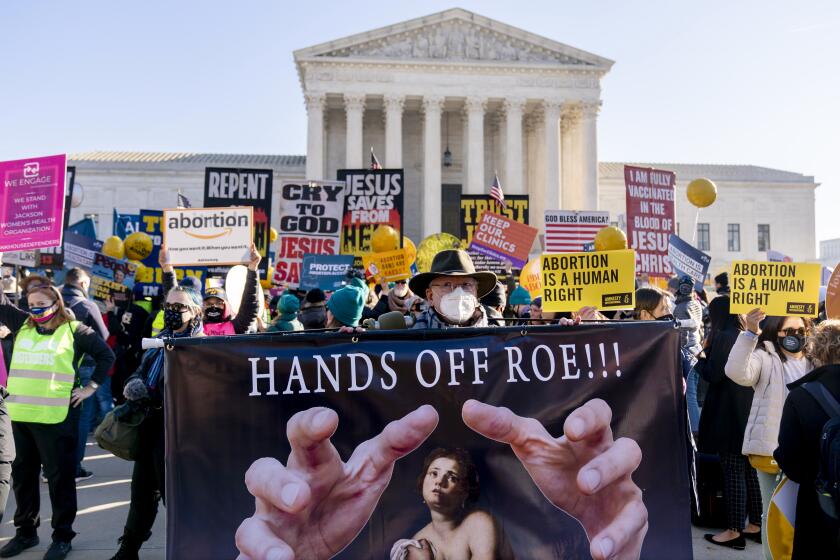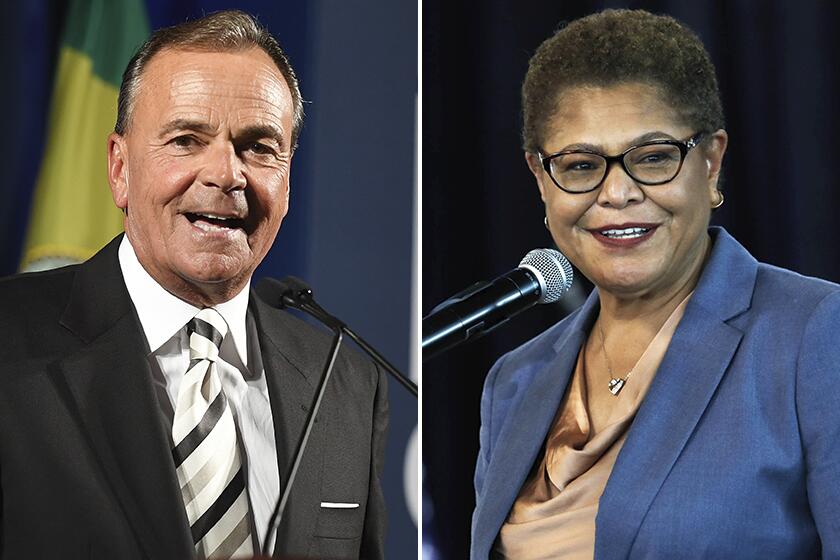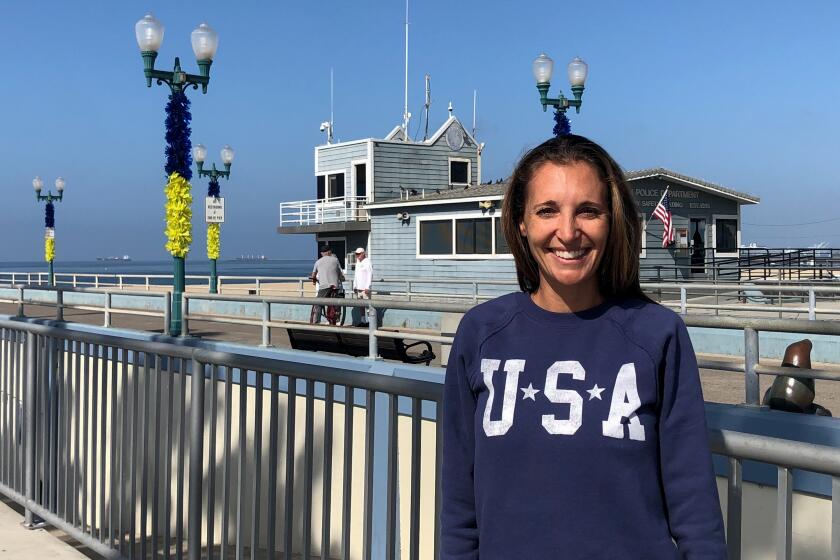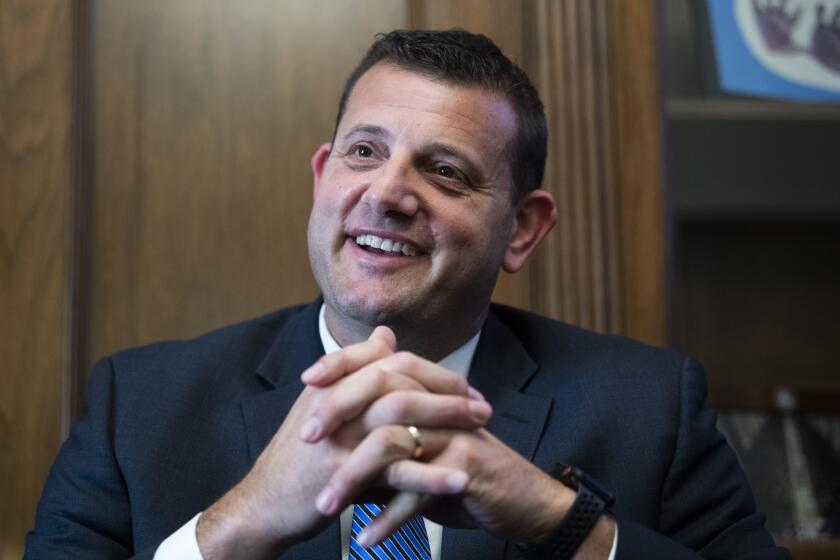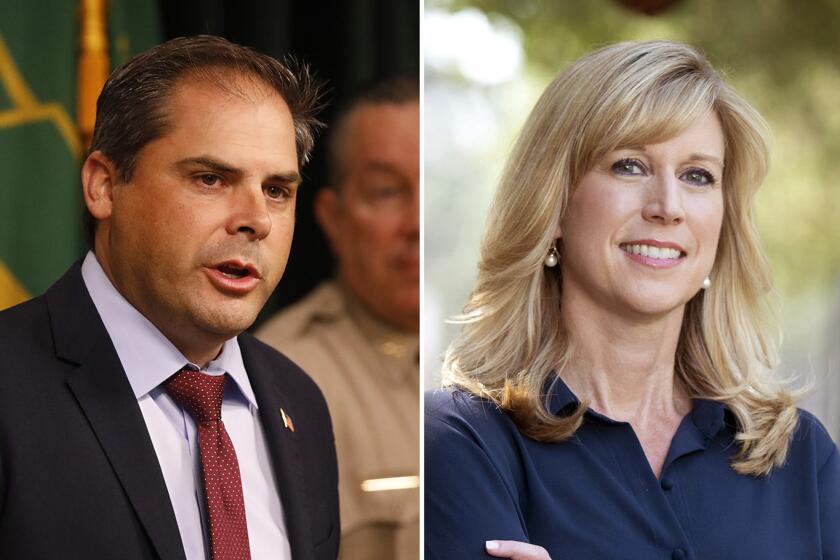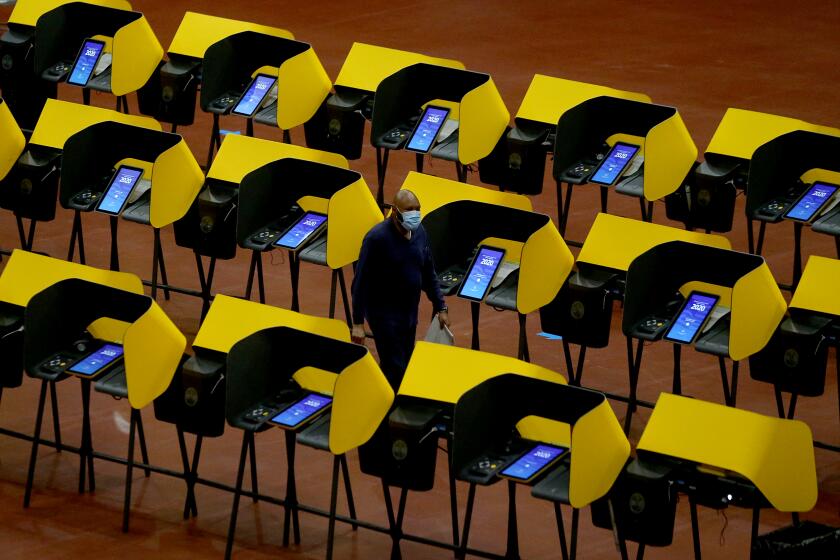What to know about California’s midterm election
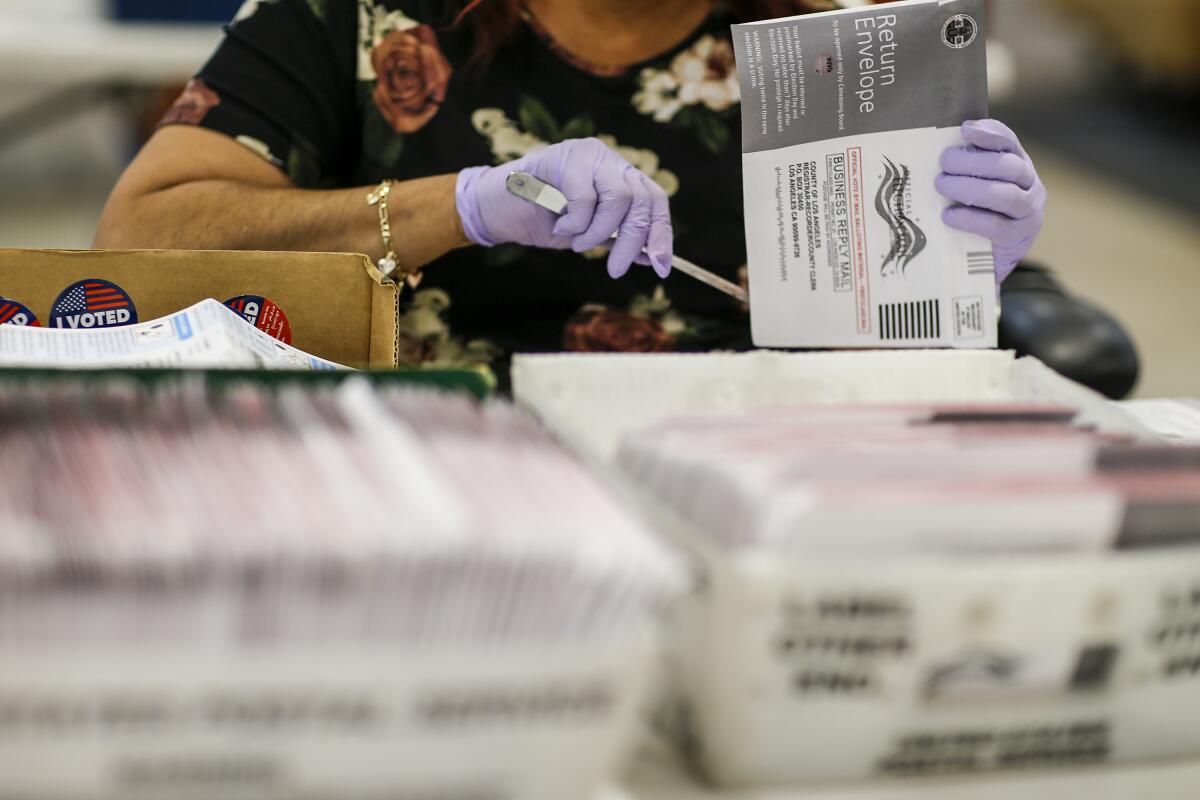
- Share via
With Labor Day in the rear-view mirror, Californians will soon be asked to weigh in on electoral contests that will shape the future of Los Angeles, the state and the nation.
Voters — concerned about homelessness, gas prices, crime and the economy — will be inundated with TV ads, mail flyers, texts and robocalls as candidates press their cases. Heavily funded campaigns are also pushing seven ballot measures on issues as varied as abortion, gaming and dialysis.
While the most prominent statewide races are not likely to be competitive because of California’s sapphire tilt, voters will decide congressional races that could determine control of the House of Representatives as well as highly competitive contests in Los Angeles that will install the next generation of leadership in the nation’s second-largest city.
Here’s what voters need to know about the 2022 midterm election:
When is the election?
Election day is Nov. 8. But in California it’s really an election month.
Ballots will be in the mail to all 22 million registered voters in the state no later than Oct. 10. Californians can return ballots by mail, drop them at collection boxes or turn them in at voting centers. They can also cast ballots early at voting centers or wait until Nov. 8 to vote at their neighborhood polling places.
Californians can register to vote or check their status at https://registertovote.ca.gov/.
Call it the ‘I don’t know’ election in the fight for Congress. Republicans still have advantages, but Democrats appear energized in the post-Roe environment.
What’s on the ballot?
A vast array of contests for congressional, statewide and local offices, as well as propositions.
Local contests
Municipal contests are unfolding around the state. None is more exciting than the Los Angeles mayoral race between Rep. Karen Bass and real estate developer Rick Caruso — a test of whether Caruso’s unlimited spending and outsider message can overwhelm Bass’ institutional support from Democrats, including President Biden and most local leaders and unions.
Earlier this year, there were questions about whether frustrated voters would support Caruso’s campaign, which targeted crime and homelessness.
Recent polling indicates that Bass has a significant lead in the race, but Caruso, a longtime Republican who is now a registered Democrat, is widely expected to unleash a massive field campaign in coming weeks.
After handily beating Rick Caruso in the June primary, Rep. Karen Bass has expanded her lead against the businessman, a new poll finds.
The city’s highest office was last open in 2013, and this is the first time in more than a century the election was realigned to coincide with state and national elections. It has attracted tens of millions of dollars in spending, making it the most expensive candidate campaign in the city’s history. Caruso, who is a billionaire, has spent more than $62 million of his money on the race.
Los Angeles County Sheriff Alex Villanueva, who has come under fire for his handling of misconduct allegations, gang-like cliques of sheriff’s deputies and other scandals, will face off against former Long Beach police Chief Robert Luna to be the county’s top law-enforcement officer. State Sen. Bob Hertzberg and West Hollywood Council Member Lindsey Horvath are running for a seat on the county Board of Supervisors — an under-the-radar panel with a $38.5-billion budget that is among the nation’s most powerful local bodies — to replace retiring Sheila Kuehl.
Congress
Though Republican were expected to have an advantage going into the midterm elections, recent developments — notably the Supreme Court ruling that overturned federal protection of abortions rights — have prompted questions about whether voter turnout in November could boost Democrats’ chances.
The Supreme Court’s expected reversal of Roe vs. Wade may sway college-educated women’s votes in key congressional races in places like Orange County.
Surprisingly strong job growth numbers, as well as declining gas prices, may also influence the election.
California, which is losing a congressional seat for the first time in its history because it didn’t grow as much as other parts of the nation, will be key to determining the balance of power in Congress. The state, with 52 representatives, will still have the largest congressional delegation in the nation, and is home to a number of competitive races.
Redistricting, the once-every-decade redrawing of congressional district lines following the Census, has created new jeopardy for candidates on both sides of the aisle.
While Democrats are on defense in much of the nation, they are optimistic about their prospects against two of the country’s most imperiled GOP incumbents in Congress: Reps. Mike Garcia of Santa Clarita and David Valadao of Hanford.
Garcia is competing for the third time with former Assemblywoman Christy Smith to represent a northern Los Angeles County district, which includes parts of the Antelope Valley and High Desert.
Assemblyman Rudy Salas is taking on Valadao to represent a swath of the San Joaquin Valley, including portions of Kern, Kings and Tulare counties.
Rep. David Valadao (R-Hanford) infuriated Central Valley conservatives when he voted to impeach Trump. But Trump is silent on Valadao’s reelection bid.
Those two districts as well as an open seat in the San Joaquin Valley are rated as tossups by the nonpartisan Cook Political Report, which has tracked House and Senate races for decades.
Democratic incumbents Katie Porter of Irvine and Mike Levin of San Juan Capistrano were drawn into tighter districts — a problem for the party if liberal voters don’t turn out in November.
Porter and former Assemblyman Scott Baugh, a Republican, are vying to represent an affluent Orange County district that spans from Seal Beach to part of Laguna Beach along the coast as well as inland cities. Former San Juan Capistrano Mayor Brian Maryott is running against Levin in a coastal district that straddles Orange and San Diego counties.
Five other California districts are expected to be competitive, drawing significant money and attention.
Sen. Alex Padilla advances to the general election, twice. Rep. Mike Garcia and Christy Smith will face off a third time in northern L.A. County.
Statewide races
The contests for governor, U.S. Senate and other offices to represent California’s 39 million residents tend to get the most attention.
However, given Democrats’ 23-point voter registration edge over Republicans as of late May, there is little chance that the party’s long-time dominance in holding these seats, including the reelection of Gov. Gavin Newsom and Sen. Alex Padilla, will be upended. (Republicans last elected candidates statewide in 2006. And one of them was an action hero movie star.)
The GOP’s best statewide hope is Lanhee Chen, a well-regarded policy expert who is running for controller, California’s chief fiscal officer. He is opposed by Malia Cohen, a Democrat who is chairwoman of the state Board of Equalization.
While Chen raised more than $4 million through Sept. 24, the most of any statewide Republican candidate, according to the California Secretary of State’s office, it’s unlikely to be enough to overcome his lack of name recognition among voters in a state with some of the most expensive media markets in the nation.
Other statewide races that will be decided in November are for lieutenant governor, secretary of state, treasurer, attorney general, insurance commissioner and superintendent of public instruction.
Voters will also cast ballots for the state Board of Equalization, the Legislature and the judicial system.
Propositions
Of the seven statewide propositions on the ballot, gambling — unsurprisingly — has attracted the most lucre. A simple majority is required to pass all these propositions.
California’s November election will feature seven statewide ballot measures.
- Hundreds of millions of dollars have already been spent on two competing sports wagering measures, Propositions 26 and 27. The former would legalize in-person sports betting on tribal lands and at a few horse-racing tracks, while the latter would allow licensed tribes and companies such as FanDuel and DraftKings to offer online sports betting.
- Proposition 31 would ban the sale of most flavored tobacco products. Tobacco companies have spent tens of millions of dollars opposing the effort.
- Wealthy Californians would pay an additional 1.75% income tax on earnings above $2 million to fund zero-emission vehicles and wildfire programs if voters pass Proposition 30. A major financial supporter of the effort is the ride-sharing company Lyft.
- Though abortion rights are sacrosanct in California, the Legislature voted to put an amendment to the state’s constitution on the November ballot after the Supreme Court overturned Roe vs. Wade. Proposition 1 would explicitly protect the right to abortion in California.
- Proposition 28 would provide about $1 billion from the state’s general fund to pay for arts and music education in public schools.
- For the third time, voters will be asked if they want greater oversight of kidney dialysis centers. Proposition 29 would require clinics to have a physician, nurse practitioner or physician’s assistant on premises during treatment hours.
More to Read
Get the L.A. Times Politics newsletter
Deeply reported insights into legislation, politics and policy from Sacramento, Washington and beyond. In your inbox twice per week.
You may occasionally receive promotional content from the Los Angeles Times.

